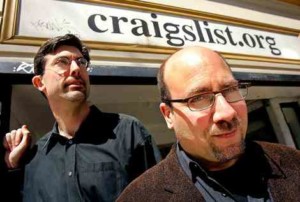This Flashback Features series unearths profiles from the past of real estate and technology leaders. A version of this story was first published in California Real Estate magazine. This profile of Craigslist founder Craig Newmark is from 2006.
By Kevin Hawkins
Craig Newmark, the Internet’s reluctant mogul, makes his daily visit to Café Reverie in the Cole Valley neighborhood of San Francisco. He has dog biscuits in his pockets and a ready smile for the next little child that he encounters.
Kids and dogs love the 53-year-old, quick-witted Craig Newmark, and so do the passionate  users of Craigslist, the online local community that helps thousands of people find a home, a job, a date or sofa. Craigslist has become an Internet phenomenon much like Google, but in a very un-Google like way: Commercialized commerce is simply not allowed; Craigslist is powered by people, not corporate advertising. His formula for success: “We just kept listening to people and gave them what they wanted,” Newmark states flatly.
users of Craigslist, the online local community that helps thousands of people find a home, a job, a date or sofa. Craigslist has become an Internet phenomenon much like Google, but in a very un-Google like way: Commercialized commerce is simply not allowed; Craigslist is powered by people, not corporate advertising. His formula for success: “We just kept listening to people and gave them what they wanted,” Newmark states flatly.
The “list” that Newmark created in 1995 was started to inform a couple of hundred friends about art and technology events. It’s now the world’s most used classified advertising service. Its numbers are staggering: In 124 U.S. communities, from Albany to Wichita, and in another 80 around the globe, more than 230,000 ads are posted on Craigslist each day.
One of the top seven Web site destinations on the planet, it’s closing in on four billion page views per month. And nearly all its classified ads are free: Craigslist’s estimated $20 million annual revenue, as reported by Fortune magazine, currently comes solely from the fees it charges employers for job postings in Los Angeles, San Francisco and New York (with Boston and Washington, D.C., likely to follow).
Most recently, the firm announced that it also would soon begin charging for real estate related listings–$10 per posting–in New York City. Despite the meager sources of income, and a Web site that looks as attractive as a community bulletin board at a local Laundromat, Craigslist reports it has been profitable since 1998.
Perhaps even more shocking is the fact that Craig Newmark, the founder and chairman, and his  co-pilot, Jim Buckmaster, whom he brought on as CEO of Craigslist six years ago, purposely avoid becoming part of the billionaire rat-pack of Internet moguls.
co-pilot, Jim Buckmaster, whom he brought on as CEO of Craigslist six years ago, purposely avoid becoming part of the billionaire rat-pack of Internet moguls.
“People usually make a different value decision,” Newmark admits when asked about cashing in, “and (Jim and I) have just made a different one and we like it.”
Buckmaster adds, “It gets easier, as we are continually reassured that the huge majority of people are well-intentioned and that the community at large is quite good at self- governance.”
Newmark and Buckmaster know that selling out would likely undermine what Craigslist is all about: a self-regulating online community ruled by the principals of democracy. “It’s simply that we are a community service,” Newmark explains. “We help people with everyday stuff within a culture of trust.”
Born and raised in Morristown, New Jersey, Newmark’s father was a salesman who succumbed to lung cancer when Newmark was 13 years old. His mother, a bookkeeper, raised him and his younger brother.
Newmark resists reflecting on his childhood for long. “I can’t remember many fond memories,” he says. He truly was the quintessential classroom nerd throughout his youth, complete with the plastic pocket protector and the tape around the middle of his thick, black-rimmed glasses. “I did have a big love of reading,” Newmark says, “but also there was a fair amount of social dysfunction.”
Early on he excelled at math and science. He remembers his first computer experience in high school. “It was an IBM 1620, and I programmed it using Fortran II with punch cards to play a game of NIM (a numbers game),” Newmark recalls.
When he turned 18, he moved to Cleveland to attend Case Western Reserve University, as it had “a good physics and computer science program,” but also “because I wanted to get away from home,” he says.
After earning both his Bachelor of Science and his Master of Science degrees at Case, in 1976 Newmark joined IBM in Boca Raton, Fla.
“I thought it might be nice living by the ocean for a while,” Newmark says, “but I disliked the humidity and heat, and sometimes you saw an insect that was right out of the National Geographic.”
IBM was in turmoil, so he relocated to Detroit for 10 years and then spent his final year with the firm in Pittsburgh. In total, he would toil at IBM for over 17 years as a programmer and a systems engineer, before relocating to San Francisco and joining Charles Schwab in 1993.
While Newmark says he never thought about his move to San Francisco as a pivotal event in his life, it was there that he found for the first time a real connection to the people and places in the Cole Valley area of the city It was San
Francisco’s ubiquitous mix of technology and the arts that Craigslist traces its roots: Newmark would send e-mails to a couple hundred friends featuring a list of local technology and arts events. He almost called it “SF Events,” until a friend persuaded him to call it what everyone else was already calling it: Craigslist.
Newmark left Schwab in 1995 and built Craigslist on the side. He consulted for corporate giants Bank of America, Xircom (Intel) and Sun Microsystems.
Craigslist continued to boom in popularity, particularly among the 20-and 30-something crowd. Newmark found the code he was writing to automate many of the functions of Craigslist were being exceeded by the consumer demand.
It was 1998 and Newmark confesses to two “huge” mistakes: he tried using volunteers to run the company, and he gave away equity–a 25 percent stake–to an employee that would eventually sell that interest to eBay in late 2004.
Newmark will not discuss the details about his mistakes. “Let’s say, I learned two lessons,” Newmark says. “First, I needed to trust my instincts, and second, I needed help that was trustworthy and competent.”
The result: Craigslist incorporated the next year, and later that year, Buckmaster posted his resume for a “lead programmer” position and was hired in 2000 as COO. Buckmaster is the perfect complement to Newmark: named to a local “sexiest man” list. Buckmaster handles people management and the general day-to-day decision-making.
Rosana Vantuyl, a REALTOR® with Zephyr Real Estate and Newmark’s real estate agent, remembers using Craigslist just as Buckmaster was coming on board. “I wanted to sell a high-end sofa on there and it was more like garage sale stuff,” she recalls. “Now you can buy and sell antiques and cars and all sorts of high-end products.” Today, the high-end list also includes real estate, with open house postings by agents as well as for-sale-by-owner listings.
Vantuyl has heard the criticism by some of her colleagues that Craigslist somehow disrupts the role of a real estate broker or agent in a transaction, but she doesn’t buy it. “There is a pretty big distinction between locating a property and facilitating the entire process,” she says. “On Craigslist, all you are really doing is identifying a property and Craig recognizes that.”
Newmark is adamant about his personal support of the real estate brokerage business. “While we have a lot of sympathy for a person looking for a place to live, but as I keep reminding everyone, brokers have to make a living,” Newmark says. “It used to be that everyone was predicting that the Net would lead to disintermediation (displacement of brokers with technology),” Newmark says.
“What we are finding is that whatever business you are in–say if you are a broker–if you add value, you do better with the Internet. If you don’t add value, you may be motivated to seek an alternative industry,” he adds.
Newmark recently sold his place, as he says, “to simplify my life.” He used his friend and REALTOR®, Vantuyl, to list his home. “My place sold faster and for more than I thought because I used a broker,” Newmark says. “I also sold a piece of investment property last year and used a broker, and after my mom moves I will sell the condo that I had bought for her.” Newmark pauses, then deadpans, “I want to assure agents that I will sell after she moves and not before.”
The recent decision to charge for real estate listings, Buckmaster notes, was something that was deliberated for more than two years. “There has been a huge outcry from our community that we should (charge),” he says.
He points out, “Brokers are widely resented in the difficult New York housing market for typically extracting a fee amounting to two months’ rent on top of already extremely high New York City rents.”
Buckmaster adds, “It took two years to overcome Craig’s very persistent concern for brokers’ welfare and wanting to give them a break.” Buckmaster laments, “Craig literally wants to give ‘everyone’ a break, regardless of the situation.”
What drives Newmark to err on the side of human goodness, Newmark admits, is what he has learned from Craigslist. “The biggest surprise is how trustworthy and how good people are,” he says, “I didn’t realize it. The number of bad guys is really small and as more and more good people get online, the proportion of bad guys represented keeps getting smaller and smaller.
Newmark pauses, to think about what he said, and adds, “But it is enough to keep my team and me busy.”
###
Kevin Hawkins is an award-winning freelance writer who lives on Bainbridge Island in Washington State.
SIDEBAR
Previous Position:
Contract Software Developer
Favorite Quotes:
If you want to tell people the truth, make them laugh …otherwise they’ll kill you. –Oscar Wilde
Brevity is the soul of wit. –Shakespeare
Favorite Website (other than your own): buzzmachine.com
Favorite Read: The Baroque Cycle Vol. 1. (Quicksilver) and Vol. 2 (The Confusion), and Vol. 3 (The System of the World), by Neal Stephenson
Life’s Goal: I need to be funnier.




